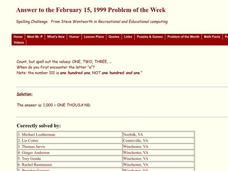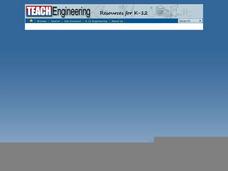Curated OER
How Big is a Molecule?
Students calculate the size of a molecule. In this molecules and their sizes lesson plan, students find the size of an oleic acid molecule by using a measured amount of drops of oleic acid to find the volume of the sample, the thickness...
Curated OER
Worksheet 2-2 Stoichiometric Tools
In this stoichiometry worksheet, students solve a variety of problems including finding empirical and molecular formulas, determining molarities of solutions, determining molecular weights of compounds and calculating the percent mass of...
Curated OER
Polymers-Greaaaaaat Biiiiiig Molecuuuuuules
Students explore polymer properties. In this lesson about polymers, students perform an experiment to understand polymers, their properties, and that they are formed from small molecules. Students role play pretending they are polymer...
Curated OER
The failure of Diplomacy, September-December 1941
Students investigate four main issues of concern between US and Japan prior to US involvement in World War II. In this role play activity, students will take the role of US and Japanese negotiators trying to find a diplomatic solution to...
Curated OER
Spelling Challenge
In this algebra worksheet, students solve a word problem using algebraic expressions. They solve a word riddle to get their final answer. There is one question with an answer key.
Curated OER
Percents: What's the Use?
Learners explore percentages in real world situations. In this percents instructional activity, students determine the final sales price after discounts. Learners interview community members and determine how percentages are used in the...
Curated OER
Using a "Natural Function" not a equation to discuss derivatives
In this derivative worksheet, learners relate the concept of the derivative to the "real world" model of seasons. Students are then asked to discuss zeros, increasing values, decreasing values, and critical values of this...
Curated OER
McMUN Model United Nations
If you have been searching for a plan to run a model U.N. simulation, this plan provides some bare bones for your lesson. Scholars break into blocs to research and discuss global issues and come up with collaborative solutions. In their...
Benjamin Franklin High School
Saxon Math: Algebra 2 (Section 3)
In this third of a twelve-part series, the focus moves from using matrices to solving systems of equations with substitution and elimination, including more than two dimensions and variables in equations, and analyzing statistical data....
EngageNY
Complex Numbers and Transformations
Your learners combine their knowledge of real and imaginary numbers and matrices in an activity containing thirty lessons, two assessments (mid-module and end module), and their corresponding rubrics. Centered on complex numbers and...
Pingry School
Synthesis of an Insoluble Ionic Salt: A Stoichiometry Experiment
Challenge young scientists to design their own experimental procedures. They write the procedure for properly preparing two grams of a water-insoluble ionic salt. To finish, they perform the experiment and collect data to prove their...
Mr. Waynes clas
Kinematics Objectives
Accelerate young physicists' learning with this collection of problem-solving worksheets. Starting off by teaching students to identify the given information and variables in physics problems, this resource goes on to challenge them...
NASA
Resolving 3-Plane Traffic Conflicts by Changing Speed—Problem Set F
Get three planes to line up safely. Individuals work through a set of problems to eliminate spacing conflicts between three airplanes in flight. The pupils use their knowledge to change the airplanes' speed or route to meet a...
Illustrative Mathematics
Margie Buys Apples
One of the most common, everyday applications of math is dealing with money. This single problem calculating how much change Margie receives is more involved than it appears at first glance. An understanding of how fractions and decimals...
Curated OER
Taxes and Sales
Collaborative discussions around this retail store problem will be taxing. Calculating discount and tax and the order of the operations are used to motivate an opportunity for learners to make a convincing argument using algebraic...
Teach Engineering
Future Flights: Imagine Your Own Flying Machines!
What will flying look like in the future? The 21st lesson in a 22-part unit on aviation reviews the major aspects of the lesson. Pupils brainstorm ideas of a future flying machine.
Inside Mathematics
Swimming Pool
Swimming is more fun with quantities. The short assessment task encompasses finding the volume of a trapezoidal prism using an understanding of quantities. Individuals make a connection to the rate of which the pool is filled with a...
EngageNY
Volume of Composite Solids
Take finding volume of 3-D figures to the next level. In the 22nd instructional activity of the series, learners find the volume of composite solids. The instructional activity the asks them to deconstruct the composites into familiar...
Curated OER
Forms of Exponential Expressions
Your young physicists analyze the forms of four equivalent exponential expressions representing an amount of a radioactive material in a substance. They show how each expression is equivalent to the others and what aspects of the decay...
Teach Engineering
Both Fields at Once?
An MRI uses both a magnetic and electricity, so how do the two interact with each other? Class members observe the effects on a charged particle when it is subject to both an electrical and magnetic field. The teacher background...
Houghton Mifflin Harcourt
Simple and Compound Interest
Your learners will get lots of practice calculating simple and compound interest by the end of this lesson. Simple explanations and examples lead learners through the concepts and steps of calculating simple and compound interest...
Curated OER
Interactive Activities to Introduce Teamwork Skills
Introduce teens to the teamwork skills and habits of mind they need to be successful in 21st century classrooms and in the workplace with the activities based on Sean Covey's The Seven Habits of Highly Effective Teens.
EngageNY
Successive Differences in Polynomials
Don't give your classes the third degree when working with polynomials! Teach them to recognize the successive differences and identify the degree of the polynomial. The lesson leads learners through a process to develop an understanding...
National External Diploma Program Council
Abbreviations
When should you abbreviate a word, and when should you write it out? Practice abbreviation rules with a resource that provides guided examples before challenging young grammarians to correct ten sentences on their own.























